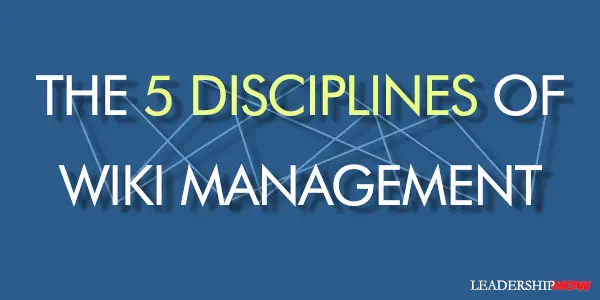 |
 |
01.14.14

The 5 Disciplines of Wiki Management
THE world we now live in has forced us to reexamine the way we lead people that gained preeminence during the industrial age and our often immature view of leadership—the “I’m in charge” mentality. Authoritarian leadership implies that the smartest, most valuable people are at the top and so the leader commands and the followers do. Not only is that not true, it’s not sustainable in a world characterized by exponential change. Rod Collins writes in Wiki Management, “Today’s managers may spend more time soliciting input from their workers, but at the end of the day, the basic social technology remains the same: The managers are still the bosses, the workers are still subordinates, and the latter are still expected to do as they are told.”“Wiki” is a Hawaiian term that refers to taking quick action to produce immediate, effective results. Coupled with management, the term offers a way to describe a way of managing designed to help managers keep pace with accelerating change. Collaborative networks are smarter and faster than top-down hierarchies. “Wiki Management assumes that the most effective organizations are highly connected, self-organized networks that are designed to leverage the power of collective intelligence and achieve extraordinary results.” Rather than leaders “acting as controllers who take charge and make the decisions, they assume the roles of facilitators of the discovery processes from which the best decisions emerge.” In general, Wiki Management is about removing inflated ego from the practice of leadership and about breaking down the barriers that define most hierarchies. Collins examines five key disciplines essential to thriving in this “flatter,” highly collaborative landscape:
Collins provides 50 concrete practices to help implement these disciplines and transition your thinking from controller to facilitator. Not everything here is new but what Wiki Management does extremely well, is to guide you through the often counterintuitive thinking that underlies collaborative leadership. It’s leadership that allows people to flourish and can help to detoxify the working environment.

Posted by Michael McKinney at 10:38 PM
|
BUILD YOUR KNOWLEDGE
 

How to Do Your Start-Up Right STRAIGHT TALK FOR START-UPS 
Grow Your Leadership Skills NEW AND UPCOMING LEADERSHIP BOOKS 
Leadership Minute BITE-SIZE CONCEPTS YOU CAN CHEW ON 
Classic Leadership Books BOOKS TO READ BEFORE YOU LEAD |